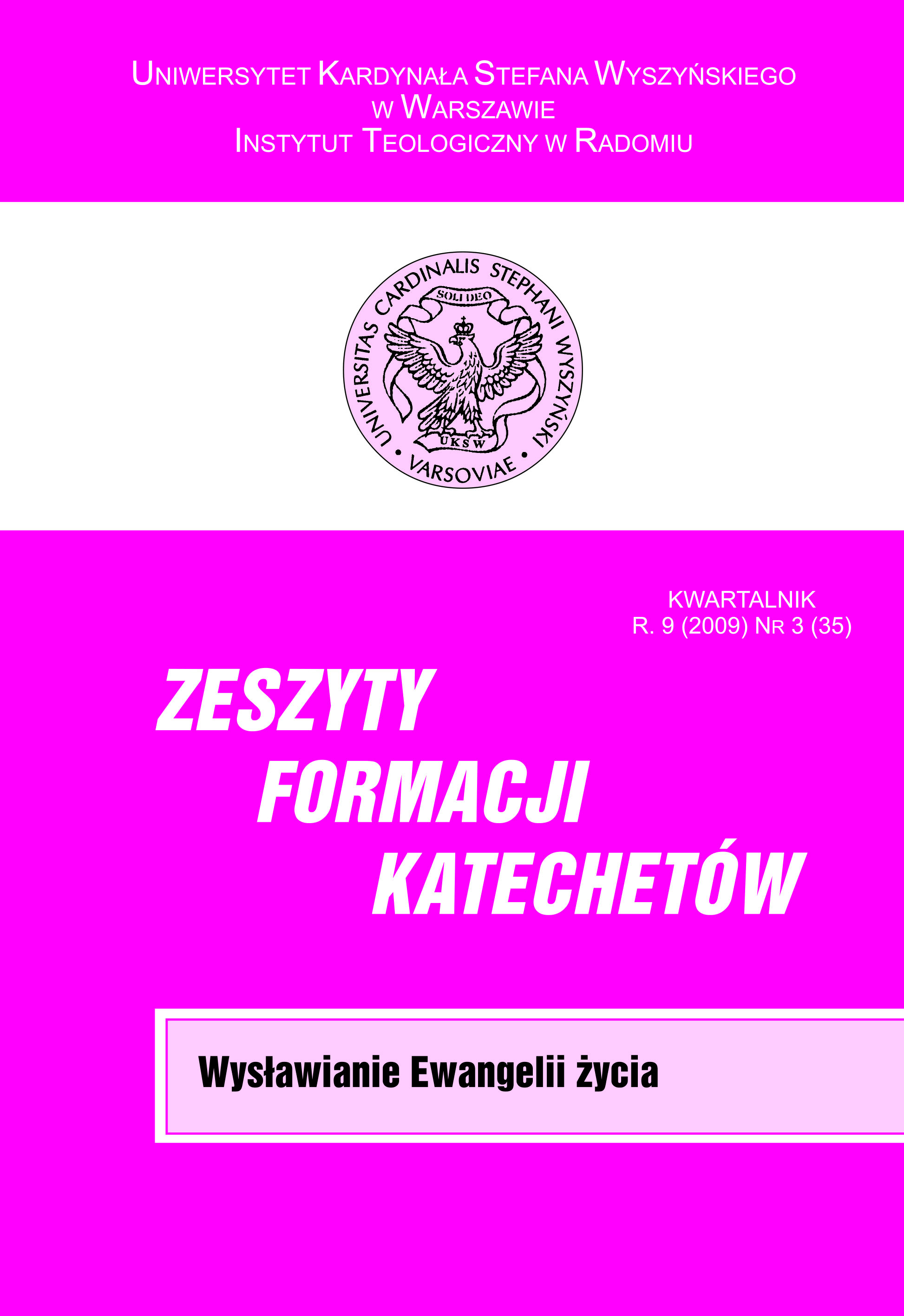Katechetyczne wartości Abrahama
Słowa kluczowe:
wartości, AbrahamAbstrakt
Źródłem głównym do dziejów Abrahama jest relacja księgi Rdz 11,26–25,18. Pierwszym człowiekiem, przez którego otrzymano od Boga lekcję wiary jest historia Abrahama -ojca wiary (Rz 4). Wiara biblijna, którą Bóg przyszedł wzbudzić w sercu człowieka, różni się zasadniczo od religii naturalnej. W religii naturalnej człowiek siebie stawia w centrum. Szuka Boga ze względu na własne plany, ich realizację. W wierze natomiast nie tylko człowiek szuka Boga, ale bardziej jeszcze Bóg szuka człowieka. W tym szukaniu Bóg znalazł kogoś, kto Mu się świetnie spisał, otworzył się na Boże plany. To był Abraham. Dlatego Abraham jest ojcem wiary w judaizmie i chrześcijaństwie. Nazywany jest „ojcem wszystkich wierzących”. Wiara jest niezbędnym warunkiem działania Boga w człowieku, a Bogu zależy na osobistym szczęściu każdego. Biblia uczy wielbić i dziękować Bogu za wszystko. Odpowiedzią człowieka na Boży plan zbawienia jest wiara; ale to dopiero początek, ludzka wiara bowiem, podobnie jak Abrahama, musi rosnąć, rozwijać się. W szkole wiary ważne jest, by znalazła się ona w otoczeniu czynników powodujących jej wzrost. Podstawą i fundamentem wiary jest uznanie prawdy, że Bóg jest Stwórcą i dawcą życia
Bibliografia
Albright W. F., A third Revision of the Early Chronology of Western Asia w BASOR, 88 (142).
Archeologia Palestyny, Poznań 1969.
Arystoteles, O duszy, II, 1, 412 b, 16.
Berkeley G., Traktat o zasadach ludzkiego poznania, paragraf 7.
Bright J., A History of Israel, Philadelphia, Westminster Press, 1959.
Dąbrowski E., Podręczna Encyklopedia Biblijna, Poznań 1959.
de Saint-Exupéry A., Mały Książę, IW Pax, Warszawa 1994.
de Saint-Exupéry Antoine, Ziemia, planeta ludzi, wyd. Siedmioróg, Wrocław 1996.
Encyklopedia Katolicka, Wyd. KUL, Lublin 1973, t. I.
Harrington W. J., Klucz do Biblii, Warszawa 1982.
Jan Paweł II, Mężczyzną i niewiastą stworzył ich, Citta’ del Vaticano 1986.
Kartezjusz, Medytacje metafizyczne, 1, VI.
Kryściak E., Powołanie w świetle Biblii, Kraków 1997.
Läpple A., Od księgi Rodzaju do Ewangelii, Kraków 1977.
Leibniz, Monadologia, paragraf 8.
Łopaszko T., Największy kataklizm w dziejach ludzkości, Lublin 1996.
Malebranche N., Dialogi o metafizyce i religii, I, 10.
Pawlak Z., Katolicyzm A-Z, Łódź 1989.
Peter M., Wykład Pisma Świętego Starego Testamentu, Poznań 1978.
Platon, Fedon, 66 b.
Pytel J., Pozbierajcie pozostałe okruszyny. Komentarze biblijne, Poznań 1974.
Schneider H., Patriarchennamen in zeitgenossichen Keilschrifturkunden, „Biblica”, 33 (1952).
Schopenhauer, Świat, cz. I, paragraf 18.
Spinoza, Etyka, II, 21.
Tollmannowie A. i E., A jednak był potop. Od mitu do historycznej prawdy, przełożyli E. i J. Kaźmierczakowie, Warszawa 1999.
Wilson I., Przed potopem. Nauka potwierdza prawdziwość biblijnego kataklizmu, przekład M. Wójtowicz, Warszawa 2002.
Włosiński M., Biblia w formacji człowieka, „ Zeszyty Formacji Katechetów” nr 2 (2007).
Włosiński M., Etyczne wartości Biblii źródłem przepowiadania, „Zeszyty Formacji Katechetów” nr 1 (2008).
Włosiński M., Jefte, modello biblico della fede, „Vita Minorum” nr 1 (2007).
Włosiński M., Pismo Święte i jego wpływ na kulturę, w: Studia Włocławskie, Włocławskie Wydawnictwo Diecezjalne, Włocławek 2003, t. 6.
Pobrania
Opublikowane
Jak cytować
Numer
Dział
Licencja
Prawa autorskie (c) 2009 Zeszyty Formacji Katechetów

Utwór dostępny jest na licencji Creative Commons Uznanie autorstwa – Użycie niekomercyjne – Bez utworów zależnych 4.0 Międzynarodowe.

